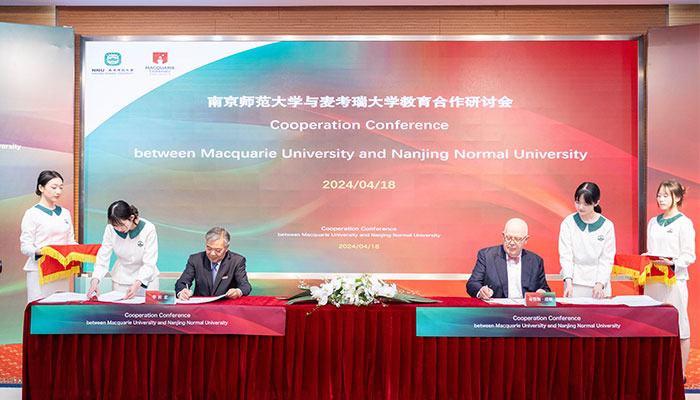China is contributing more than any other country to a climate change solution by investing in renewable technologies, which are driving down the cost of energy globally, says Professor John Mathews in an article for Nature Magazine, the world’s leading science journal.
In the article, MGSM Professor John Mathews and his collaborator Dr Hao Tan, alumnus of MGSM, argue that the world economies should follow China’s lead and place an emphasis on production scale and market growth of renewable technologies to drive down prices and increase uptake. Mathews points to this as a viable alternative to the measures agreed in the Kyoto Protocol - which has been so ineffective in cleaning up the world’s still carbon-heavy energy supplies.
“As the scale of Chinese manufacturing has grown, the costs of renewable-energy devices have plummeted,” said Professor Mathews.
“While countries such as Germany and South Korea, like China, are boosting their national renewable-energy industries and markets, others, including the United States, seem yet to notice this shift and are pursuing ineffective energy policies, including moving to alternative fossil-fuels sources like coal-seam gas, and putting trade tariffs on Chinese-made solar panels,” he said.
“China renewables must be seen as a source of energy security, not just of reduced carbon emissions,” says Mathews.
The reason for this, he says, is that renewables are the products of manufacturing, which can in principle be performed anywhere, and which captures experience in the form of reducing costs as production expands.While Australia is not the focus of his article, Professor Mathews points out some clear implications.
“The current wave of anti-renewables rhetoric and action by the Australian government is out of step with the rest of the world, and in particular with China and India, which both see renewables as an important and growing element of their energy mix,” said Professor Mathews.
“There is a second clear implication: as they build their renewables industries, China and India will come to depend less and less on fossil fuels – and in particular, less and less on imports of Australian fossil fuels,” he said. “This means that long-term prospects for Australia’s fossil fuel export industries are not good. “Australia would be better served by building tomorrow’s renewable energy industries.
“China is leading the way to a world of decarbonized energy, by placing the emphasis of its policy on growing the markets for renewables and building the industries to supply wind turbines, solar cells, batteries and other devices. In this way it is driving down costs and making renewables more accessible to all countries. This is good for China, and for the world."
The Nature article appears on the Nature website. Professor Mathews also recorded an interview to give the background to the article, which is now carried as a podcast on the nature website. The work reported by Dr Mathews in the Nature article is elaborated in his forthcoming book, “Greening of Capitalism: How Asia is Driving the Next Great Transformation”, to be published by Stanford University Press in November.
In the article, MGSM Professor John Mathews and his collaborator Dr Hao Tan, alumnus of MGSM, argue that the world economies should follow China’s lead and place an emphasis on production scale and market growth of renewable technologies to drive down prices and increase uptake. Mathews points to this as a viable alternative to the measures agreed in the Kyoto Protocol - which has been so ineffective in cleaning up the world’s still carbon-heavy energy supplies.
“As the scale of Chinese manufacturing has grown, the costs of renewable-energy devices have plummeted,” said Professor Mathews.
“While countries such as Germany and South Korea, like China, are boosting their national renewable-energy industries and markets, others, including the United States, seem yet to notice this shift and are pursuing ineffective energy policies, including moving to alternative fossil-fuels sources like coal-seam gas, and putting trade tariffs on Chinese-made solar panels,” he said.
“China renewables must be seen as a source of energy security, not just of reduced carbon emissions,” says Mathews.
The reason for this, he says, is that renewables are the products of manufacturing, which can in principle be performed anywhere, and which captures experience in the form of reducing costs as production expands.While Australia is not the focus of his article, Professor Mathews points out some clear implications.
“The current wave of anti-renewables rhetoric and action by the Australian government is out of step with the rest of the world, and in particular with China and India, which both see renewables as an important and growing element of their energy mix,” said Professor Mathews.
“There is a second clear implication: as they build their renewables industries, China and India will come to depend less and less on fossil fuels – and in particular, less and less on imports of Australian fossil fuels,” he said. “This means that long-term prospects for Australia’s fossil fuel export industries are not good. “Australia would be better served by building tomorrow’s renewable energy industries.
“China is leading the way to a world of decarbonized energy, by placing the emphasis of its policy on growing the markets for renewables and building the industries to supply wind turbines, solar cells, batteries and other devices. In this way it is driving down costs and making renewables more accessible to all countries. This is good for China, and for the world."
The Nature article appears on the Nature website. Professor Mathews also recorded an interview to give the background to the article, which is now carried as a podcast on the nature website. The work reported by Dr Mathews in the Nature article is elaborated in his forthcoming book, “Greening of Capitalism: How Asia is Driving the Next Great Transformation”, to be published by Stanford University Press in November.



